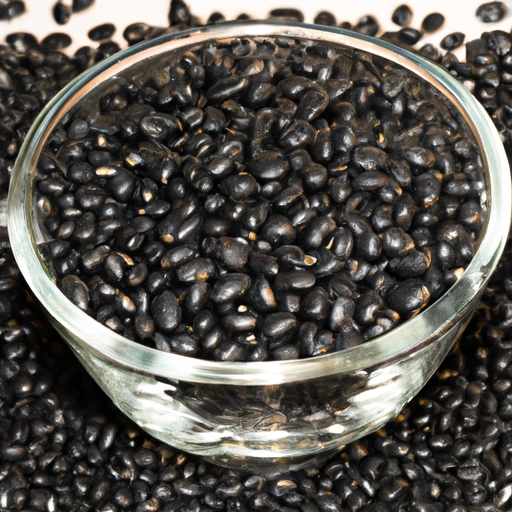Black Bean
Description

The black bean, also known as the black turtle bean, is a small, shiny variety of the common bean (Phaseolus vulgaris) particularly popular in Latin American cuisine, though it has found its way into a variety of dishes worldwide. Rich in protein and fiber, black beans are a powerhouse of nutrition, often found in both dried and canned forms in supermarkets.
Common uses
Black beans are incredibly versatile and can be used in a multitude of dishes. They are a common ingredient in soups, stews, salads, and as a staple in many vegetarian and vegan dishes due to their high protein content.
Nutritional value
Calories
A 1-cup serving (about 172 grams) of cooked black beans provides approximately 227 calories (950 kilojoules).
Protein
That same serving size offers about 15 grams of protein, which is around 30% of the daily recommended value.
Fat
Black beans are low in fat, with 1 cup containing only about 1 gram of fat.
Carbohydrates
Black beans are a good source of complex carbohydrates, with a 1-cup serving containing around 41 grams.
Vitamins
They are also rich in B vitamins, particularly folate, with a 1-cup serving providing 256 micrograms, which is 64% of the Daily Value (DV).
Minerals
Black beans are a good source of minerals like magnesium, phosphorus, and iron, providing 120 milligrams, 241 milligrams, and 3.6 milligrams respectively per 1-cup serving.
Health benefits
Regular consumption of black beans can contribute to digestive health due to their high fiber content, which can help prevent constipation and promote a healthy gut microbiota. Their low glycemic index makes them an excellent food choice for managing blood sugar levels, particularly for individuals with diabetes. The folate and iron in black beans also support healthy blood formation and function.
Potential risks
While black beans are generally considered safe and healthy, some individuals may experience gastrointestinal discomfort, such as gas or bloating, due to the high fiber content. Additionally, those with a specific bean allergy should avoid black beans.
Common recipes
Popular recipes featuring black beans include Brazilian feijoada, Cuban black beans and rice, Mexican black bean soup, and vegetarian black bean burgers.
Cooking methods
Black beans can be soaked and boiled, used straight from the can, or incorporated into a variety of cooking processes including baking, frying, and pureeing.
Pairing with other ingredients
Black beans pair well with flavors such as cumin, cilantro, and chili. They are often accompanied by rice, corn, and a range of vegetables like bell peppers and onions.
Summary
Black beans are a nutritious and adaptable ingredient that can be easily included in a wide range of dishes. With their historical significance and health benefits, they are a valuable addition to any diet. Whether in traditional Latin American dishes or modern vegetarian cuisine, black beans offer a delicious and satisfying experience.